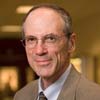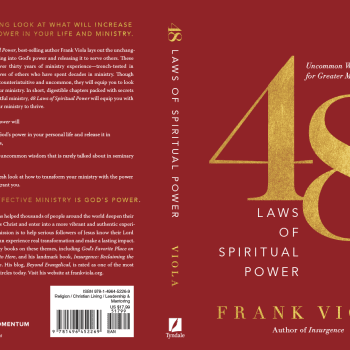 An Interview with Mark Noll
An Interview with Mark Noll
By Timothy Dalrymple
Mark Noll is indisputably one of evangelicalism's most renowned scholars and intellectuals. His The Scandal of the Evangelical Mind is one of the most influential Christian scholarly books of the past two decades. In 2005 he was named by Time magazine as one of the twenty-five most influential American evangelicals. In 2006, he was awarded the National Humanities Medal by George W. Bush, and, after twenty-seven years at Wheaton College, he took a chair in history at Notre Dame University. In recent years he has authored or co-authored The Rise of Evangelicalism, Is the Reformation Over? An Evangelical Assessment of Contemporary Roman Catholicism, The Civil War as a Theological Crisis, and The New Shape of World Christianity.
For Patheos' series on the Future of Evangelicalism, he spoke by phone with Timothy Dalrymple.
You've written on a broad variety of topics, and I want to ask questions in several different areas. The first concerns evangelicals, Catholics, and education. Even before you moved to Notre Dame, you engaged in dialogues with Catholics. You signed in 1994, for instance, a document called "Evangelicals and Catholics Together."
Some maintain that there is, today, a convergence between evangelicals and Catholics. One of the contributors to this series writes, "We are witnessing the opening of a great evangelical era in American Catholicism." Are we finally seeing a convergence between American Catholics and American evangelicals? And can evangelicals hope for increasingly close ties between their churches and Catholic churches in the years to come?
I'm not sure I'd use the word convergence for what has taken place, and certainly would not use the word reunion or union. Nonetheless, there certainly have been significant and even dramatic changes in relations between Catholics and evangelical Protestants since the Second Vatican Council. That's a crucial turning point. The Council accomplished many things, among them adding a stress on scripture as an authority in the church, adding a stress on the whole people of God, including the laity, and adding a stress on the need for personal engagement and commitment. All of these things certainly existed in the Catholic tradition, but now are emphasized in a way that, I think, Protestant evangelicals can appreciate.
Certainly there is a great deal more cooperation, a great deal more awareness and discussion between at least some Catholics and some Protestant evangelicals. On education, for example, there has been a great deal of mutual interchange and learning, a great deal of reading of one another's books. Since most of the tasks of higher education are really not denominationally specific, these set up domains where there is a lot of cooperation possible.
I do think there is a certain segment within evangelical Christianity today that is more concerned about the past, the historical liturgy, the sacrament. And whenever you get these kinds of interests, you obviously have a strong interest in Catholicism and Eastern Orthodoxy as well. Among Catholics, I think the stress on the Bible, the stress on the life and teachings of Jesus, has been attractive to evangelicals. So, without thinking that there is soon going to be any convergence or reunion, it does seem to me that there are many more avenues today of profitable discussion and mutual learning.





